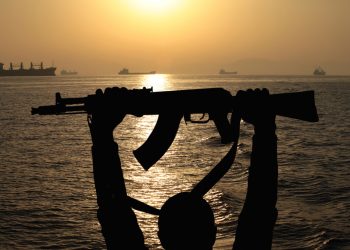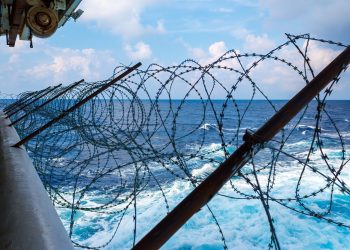USCG’s Port Security Advisory concerning Indonesia
The Maritime Transportation Security Act of 2002 (MTSA) has mandated that the United States Coast Guard evaluate the effectiveness of anti-terrorism measures in foreign ports and provides for the imposition of conditions of entry on vessels arriving to the United States from countries that do not maintain effective anti-terrorism measures (MTSA, 46 USC 70108).
The Coast Guard has determined that the Republic of Indonesia is now maintaining effective antiterrorism measures in their ports. The Republic of Indonesia is removed from the list of the Countries
Affected in paragraph B of this Port Security Advisory. Therefore, actions required in paragraphs C and D of this Port Security Advisory are no longer required for vessels that arrive in the United States after visiting ports in the Republic of Indonesia.
Countries Affected
The Coast Guard has determined that ports in the following countries are not maintaining effective antiterrorism measures:
- Cambodia (with the exception of Phnom Penh Autonomous Port – IMO number not listed; and Sihanoukville Autonomous Port – IMO number not listed)
- Cameroon (with the exception of Ebome Marine Terminal – CM394-0001; Quai GETMA (LAMNALCO Base) Facility – CMDLA-0005; Société Nationale de Raffinage (SONARA) Terminal – IMO number not listed; and Kome-Kribi 1 – CM234-0001)
- Comoros
- Cote d’Ivoire
- Cuba
- Equatorial Guinea (with the exception of Ceiba – GQ362-0001/0002; K-5 Oil Center – IMO number not listed; Luba – GQLUB-0001; Punta Europa Terminal – GQ368-0001; and Zafiro Marine Terminal – GQ370-0001)
- Guinea-Bissau
- Iran
- Liberia (with the exception of the Firestone Facility – IMO number not listed; and Port of Monrovia – IMO Number LRMLW-0001)
- Madagascar (the exception of Toamasina (also known as Tamatave) – MGTMM-0001)
- Sao Tome and Principe
- Syria
- Timor-Leste
- Venezuela
- Yemen (with the exception of Ash Shihr Terminal – YEASR-0001; Balhaf LNG Terminal – IMO number not listed; and the Port of Hodeidah – YEHOD-0001)
Actions Required by Vessels Visiting Countries Affected
All vessels arriving to the United States that visited the countries listed in paragraph B (with exceptions noted) during their last five port calls must take actions 1 through 5 listed below while in the countries listed in paragraph B as a condition of entry into U.S. ports:
1. Implement measures per the ship’s security plan equivalent to Security Level 2;
2. Ensure that each access point to the ship is guarded and that the guards have total visibility of the exterior (both landside and waterside) of the vessel. Guards may be:
- provided by the ship’s crew, however, additional crewmembers should be placed on the ship if necessary to ensure that limits on maximum hours of work are not exceeded and/or minimum hours of rest are met, or
- provided by outside security forces approved by the ship’s master and Company Security Officer.
3. Attempt to execute a Declaration of Security;
4. Log all security actions in the ship’s log; and
5. Report actions taken to the cognizant U.S. Coast Guard Captain of the Port prior to arrival in the U.S.
Vessels that visited the countries listed in paragraph B (with exceptions noted) on or after the effective date in paragraph A, during their last five port calls will be boarded or examined by the Coast Guard to ensure the vessel took the required actions. Failure to properly implement the actions listed in paragraph
C.1 through C.5 may result in delay or denial of entry into the United States.
Actions Required by Vessels in U.S. Ports
Based on the findings of the Coast Guard boarding or examination, the vessels that visited the countries listed in paragraph B (with exceptions noted) on or after the effective date in paragraph A may be required to ensure that each access point to the ship is guarded by armed security guards and that they have total visibility of the exterior (both landside and waterside) of the vessel while in U.S. ports. The number and location of the guards must be acceptable to the cognizant U.S. Coast Guard Captain of the Port.
For those vessels that have demonstrated good security compliance and can document that they took the measures called for in C.1. through C.4. above, the armed security guard requirement will normally be waived.
Source: USCG

































































